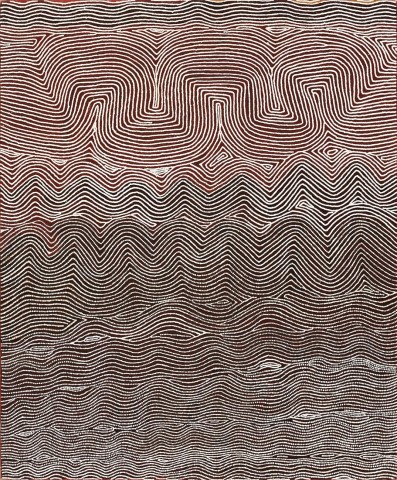MAW MAW YNTJIPI, 1999
WARLIMPIRRNGA TJAPALTJARRI
synthetic polymer paint on linen
183.0 x 152.0 cm
bears inscription verso: artist's name, size and Papunya Tula Artists cat. WT991127
Painted at Kintore in 1999
Papunya Tula Artists, Alice Springs
Private collection, Sydney
Sotheby's, Melbourne, 31 July 2006, lot 119
Private collection, Sydney
In his essay on Warlimpirrnga Tjapaltjarri for the No Boundaries exhibition catalogue, Luke Scholes writes, (Warlimpirrnga) ‘creates epic, barbed renderings that shimmer and gleam with the potency of the objects from which they are drawn: Pearl Shells and kurkitiji (shields)’.1 Central to these renderings are the interlocking key designs that relate to the mythical Tingari and which are found engraved onto Pintupi ritual and domestic objects.
The painting offered here, Maw Maw Yntjipi, 1999, is a captivating interpretation of the landscape that Warlimpirringa criss-crossed in the early part of his life. A swamp and soakage water site south of Wilkinkarra (Lake Mackay), the country visually warps and folds across the surface of the canvas in imitation of the topography of the desert. Waves of sand ridges and dunes are rendered as though viewed in the changing light of the desert, an effect enhanced by the variously-coloured underpainting. Designs constructed of parallel meandering lines and zigzags echo those found incised on wunda shields and pearl shells, a nod to his importance as a maparntjarra or traditional healer and keeper of knowledge.
Warlimpirrnga first came to public attention as part of a small family group who created a media sensation when, in 1984, they walked into the Pintupi community of Kiwirrkura. The family up to that time had been living a traditional life to the west of Wilkinkarra at the northern end of the Gibson Desert, and although they had not experienced any direct contact with European Australians, they knew of their presence. Three years later in 1987, he commenced painting for Papunya Tula Artists under the guidance of his close relative George Tjungurrayi. The following year, a mere four years after his arrival at Kiwirrkura, Warlimpirrnga’s first solo exhibition of eleven paintings at Gallery Gabrielle Pizzi in Melbourne was purchased in its entirety by Nellie Castan and her late husband Ron, and later donated to the National Gallery of Victoria, Melbourne.
Over the past two decades, Warlimpirrnga has become widely acknowledged as one of Australia’s major contemporary artists and his work, described by Scholes as both muscular and gentle,2 reflects his confidence in painting the country around Wilkinkarra for which he shares custodial responsibilities. His work is held by local and international museums and has been shown in significant survey exhibitions including dOCUMENTA 13, held in Kassel Germany in 2012, where Warlimpirrnga, was invited to participate and exhibit his paintings alongside the best examples of contemporary art from across the globe.
1. Scholes, L., ‘Warlimpirrnga Tjapaltjarri: Powerful presence in person and in paint,’ in Skerritt, H., ed. et al, No Boundaries: Australian Aboriginal Contemporary Abstract Painting, Prestel Verlag, Munich-London-New York, 2014, p. 136.
2. ibid.
CRISPIN GUTTERIDGE
